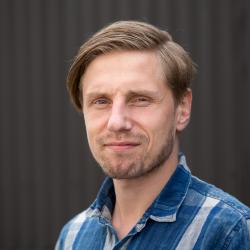In June, outrage shook the nation as news broke that the Indian-born Bala Kamallakharan was denied Icelandic citizenship due to a speeding ticket. Bala had lived with his Icelandic wife and children in the country for eleven years and decided he wanted to make his bond with his adopted country official. But six months after applying for citizenship, he received a letter informing him that he had been denied.
“First, when I came here I didn’t even think about applying, but then it just felt like the right thing to do,” Bala explains. “I felt this was home, I felt I was a part of the community and I wanted to put a stake in the ground and call this my country. During the Euros I also experienced something weird. When we lost against France I felt bad, I was hurting because we lost.”
From India to Iceland, via the US
Bala was born in Chennai, then called Madras, to a middle-class family and went on to study at a school connected to MIT; he did an undergraduate degree in business studies and later moved to the US. There he did a graduate degree in economics and information systems at Louisiana State University. “I decided not to go to MIT as I felt that the north was to cold for me,” he explains, before adding “which is ironic seeing as I live in Iceland.”
During his studies he met his Icelandic wife, Agusta Berg; they wed in 2001. They then moved to Houston, Texas, where he got a job with Ernst & Young and his wife with Deloitte. In 2003, their first daughter was born and they decided to make a change, in order to spend more time with her. They moved to Iceland in 2004. He had trouble finding work here, until a chance encounter with the CEO of Íslandsbanki. The following year, Bala was offered a job as a consultant at the bank, which he left following the crash of 2008.
Startup Iceland
In recent years, Bala has been an active investor in the Icelandic startup scene. In 2012 he founded Startup Iceland, as a way to get entrepreneurs to form a community around their projects, with mutual support from peers and advice from established mentors. “Iceland has all the potential to become a hub for startup, there are so many great entrepreneurs here,” he says.
The community he had built up around the Icelandic startup scene made a big impact on him, and influenced him to apply for citizenship.
Turned down for a fine
“The process wasn’t very difficult to begin with,” Bala explains. “I had to fill out a form and prove that I didn’t have a criminal record from any of the countries I had lived in; that was not problem. Then six months later, I got a six- or seven-page paper. My wife read it for me and she said, ‘This is so wrong, you didn’t get those speeding tickets.’ They had written that I’d gotten three speeding tickets–and not one, which was correct.”
The police had incorrectly issued two more speeding tickets to him—his wife had been driving their car at the time—and despite having informed the police of the error immediately and having had it corrected, the Directorate of Immigration (UTL) had failed to take that into account. UTL’s requirements state that a fine of over 50,000 ISK can be cause for rejecting an application for citizenship, but the fine Bala had paid for the ticket he received only amounted to 30,000.
“First I said, ‘I don’t care, I don’t need the citizenship,’ Bala recalls, “but then I thought, ‘No, what if my livelihood depended on it?’ So we decided to fight it.” ,“ Bala said.

Bala had lived with his Icelandic wife and children in the country for eleven years and decided he wanted to make his bond with his adopted country official.
The outpouring of support for “‘the right guy”’
After receiving the rejection letter, Bala wrote a Facebook status that caught people’s attention, was widely shared, with hundreds expressing their support and outrage.
“I was very surprised by the support I got,” Bala says. “People were telling me, ‘They picked the wrong guy,’ but I said, ‘No, they picked the right guy.’ Because if I had been some Syrian it wouldn’t have received this amount of attention. But because I have been able to build this startup community and to touch the lives of so many, it put focus on the issue.”
Changing the immigration system
Following his experience with the immigration, Bala has decided to fight to improve the system. He has spoken with MPs, and been a part of a work group focussing on the problem. Now, he can’t help but feel a sense of optimism about the chance for change.
“We need a more pragmatic immigration system, which understands the skills of people and how they can help Icelandic society,” Bala says. “But I believe that there is a willingness among politicians, both in the government and the opposition, to change things. Immigration is a hot issue in the world today, but as an immigrant I can unapologetically say that immigrants work harder than anyone else—they have something to prove. So we should be embracing immigration, we need hard-working people.”
Buy subscriptions, t-shirts and more from our shop right here!
















